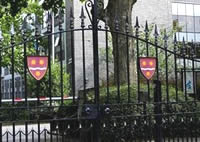London Oratory Declares High Court Victory over Admissions Policy
A war of words has broken out following London Oratory School's appearance at the High Court defending its controversial admissions policy.
The Roman Catholic school in Fulham is declaring it has been vindicated, after Mr Justice Cobb said that the Schools Adjudicator, which ruled that the school broke the admissions code through the use of certain faith-based critera, was " unlawful and/or unreasonable" in key areas.
In particular, says the school, he ruled that the Adjudicator’s finding that the admissions criteria unfairly disadvantaged children from less well-off families was wrong. The Judge pointed out that the Adjudicator's finding was based on "flawed and/or deficient reasoning" and that he "reached this conclusion by a mix of flawed reasoning and unfair process".
The school's headmaster, David McFadden said: " The Judge's decision supports us in continuing to preserve the School's ethos and serving Catholic families throughout the whole of London.
" It is profoundly regrettable that the School - and other schools - have to expend precious resources, year after year, in standing up to the Office of the Schools Adjudicator. These are key resources that should go to our children's education and their future, not overturning ultimately flawed and unmeritorious decisions. Schools within the state sector have serious questions to ask about the adjudication process."
However the British Humanist Association, which made the complaint which led to the adjudicator's ruling, says that in its report on the London Oratory’s admissions policy published last year, the Office of teh Schools Adjudicator, or OSA found a total of 105 breaches of the School Admissions Code, which all state schools are obliged to follow. However, in its judicial review the school chose to challenge the determination on only a handful of these grounds, leaving the vast majority of the breaches undisputed.
And it says, despite comments from the school declaring a victory, analysis of the judgment carried out by the BHA reveals that in almost every case where the judge ruled in favour of the school, the victory was partial, temporary, and/or of no practical consequence.
Crucially, says the association, the school also failed in the primary focus of its challenge, namely to overturn the decision that it can no longer include a 'Catholic service criterion' in its admissions policy, which had previously allowed it to give priority to children on the basis of activities such as flower arranging and choir singing.
Mr Justice Cobb upheld the decision of the OSA in this regard and confirmed that this practice was not compliant with the code in a variety of different ways.
Responding to the judgment, BHA Campaigns Manager Richy Thompson said: " The Oratory still stands as having been found guilty of something like 99 breaches of the School Admissions Code. The evidence is clear, the school’s intake has consistently been found to be socio-economically skewed and Mr Justice Cobb did not refute the Adjudicator’s contention that a degree of social selection of school candidates was 'inherent' in the admissions criteria.
" It is amongst the ten most socio-economically selective state secondary schools in the country, taking just 6% of pupils eligible for school meals compared to 36% locally.
" At any rate the school failed to achieve the main aim of its challenge, as the judgment clearly upholds the OSA’s decision that it must stop selecting pupils on the basis of activities such as flower arranging.
" It’s clear that nothing has really been resolved in the school’s favour with this judgment and some aspects depend on further submissions and clarification."
The Seagrave Road Roman Catholic school's policy uses a grid system to score potential pupils against eight mainly religious criteria, including whether parents spend at least three years on church duties, for example singing in the choir, arranging flowers or voluntary work.
You can read Mr Justice Cobb's judgment in full here.
April 20, 2015
